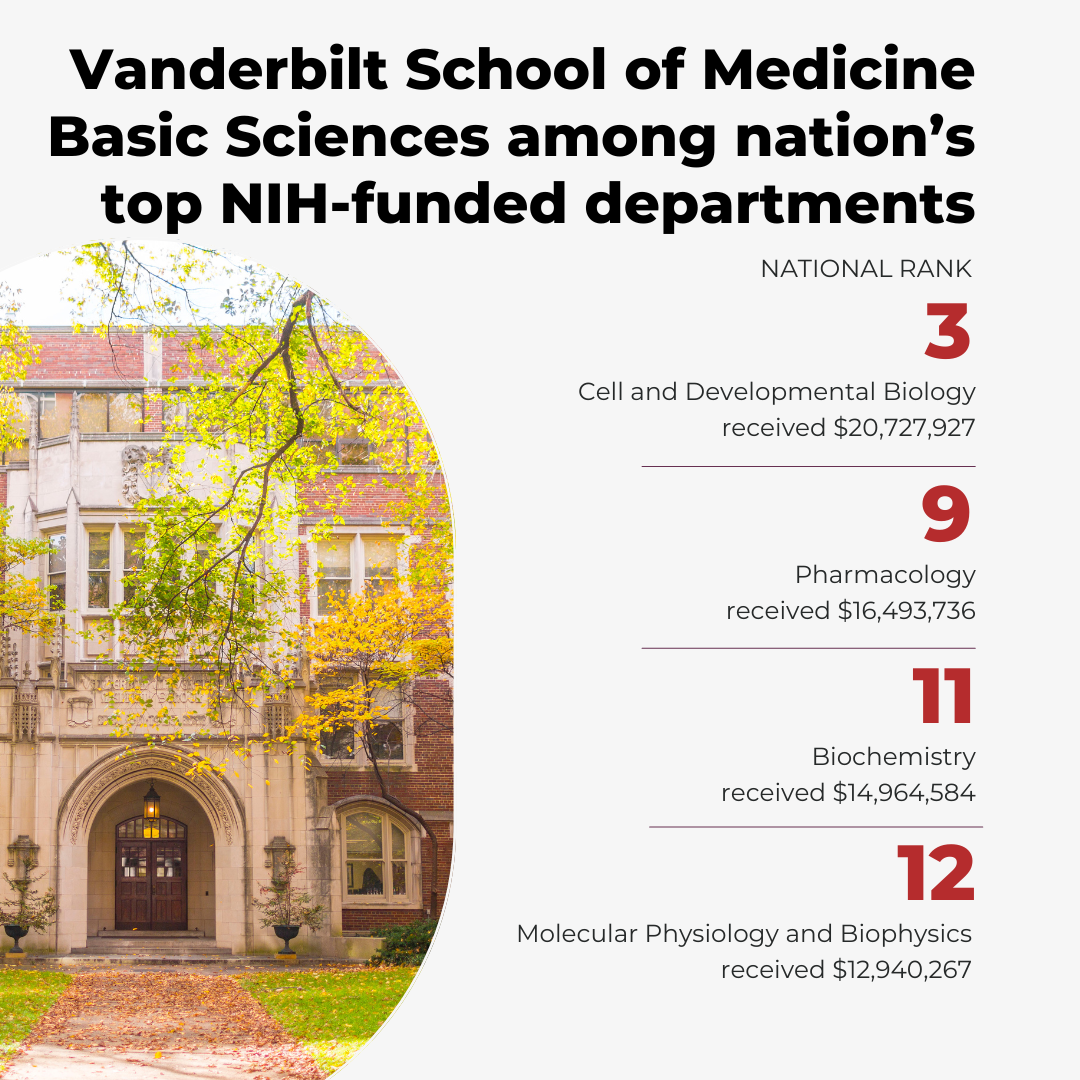The School of Medicine Basic Sciences four departments, biochemistry, cell and developmental biology, pharmacology, and molecular physiology and biophysics, pulled in more than $65 million in National Institutes of Health funding in fiscal year 2023, as reported by the Blue Ridge Institute for Medical Research. The School of Medicine ranked 10th in the nation in total research grant support during the same period, with $527.7 million.
- Biochemistry received $14,964,584, ranking 11th
- Cell and Developmental Biology received $20,727,927, ranking third
- Pharmacology received $16,493,736, ranking ninth
- Molecular Physiology and Biophysics received $12,940,267, ranking 12th
Funding for basic science research supports the exploration of the intricate processes that cause health problems, identification of diseases in their early stages, development of treatments to cure disease, and ways to prevent the factors that cause medical conditions.
“We are truly grateful to the U.S. taxpayers for supporting Vanderbilt University and Vanderbilt University Medical Center research through the National Institutes of Health. We strive to give them their money’s worth!” said Charles Sanders, Aileen M. Lange & Annie Mary Lyle Professor of Cardiovascular Research, vice dean of Basic Sciences, and professor of biochemistry. “NIH is a national treasure that not only provides treatments and cures for human disease, but creates jobs, technologies, and all sorts of other spin-off benefits that everyone benefits from.”
Largely an indicator of an institution’s strength in biomedical research, the funding data was obtained from the Research Portfolio Online Reporting Tool from the National Institutes of Health. The NIH is the nation’s medical research agency and a leading supporter of biomedical research in the world.
“The NIH provides a critical source of research support for our scientists that enables the discovery of fundamental mechanisms underlying human health and disease,” said David Cortez, Richard N. Armstrong Ph.D. Professor of Innovation in Biochemistry and chair of the Department of Biochemistry. “The strong funding portfolio in the department is due to the ingenuity and determination of our exceptional faculty working jointly with staff and trainees.”
“We are excited to have retained our number three ranking among cell biology departments in the U.S., and our funding continues to trend upwards,” said Ian Macara, Louise B. McGavock Professor and chair of the Department of Cell and Developmental Biology. “Last year we also brought in about $11 million in non-NIH funding, also on an upward trajectory. These numbers reflect the very hard work by our CDB faculty, at all levels, who are doing amazing science and building highly successful, internationally recognized research groups.”
“The gratifyingly high ranking we’ve maintained over the years is due both to our world-class scientists’ pioneering, field-defining discoveries and to the environment we’ve created, which fosters innovative, forward-looking ideas—such as the one that recently led us to found our Center for Applied AI in Protein Dynamics,” said Dr. Nancy Carrasco, Joe C. Davis Chair in Biomedical Science and chair of the Department of Molecular Physiology and Biophysics. “It’s these discoveries and this environment that are enabling us not only to better understand health and disease and develop new treatments for the latter, but also to lay bare—at the molecular level—the fundamental mechanisms of life itself.”
“Our grant portfolio comprises a diverse collection of investigator-initiated grants that support individual projects across our department. This fact and our high ranking among our peers strongly attest for the ingenuity and creativity of our faculty in obtaining and sustaining competitive funding in these difficult times where support for basic research is becoming increasingly limited,” said Ege Kavalali, William Stokes Professor of Experimental Therapeutics and chair of the Department of Pharmacology.
